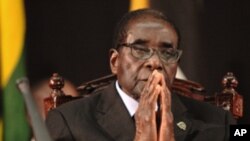Zimbabwe's Supreme Court on Thursday dismissed President Robert Mugabe's appeal against a High Court decision directing him to gazette a date for by-elections in three parliamentary constituencies.
Chief Justice Godfrey Chidyausiku heard the appeal together with Judges Vernanda Ziyambi, Paddington Garwe, Yunus Omerjee and Anne-Mary Gowora.
The justices unanimously agreed Mugabe should proclaim the by-election dates in a government gazette no latter than August 30.
Advocate Ray Goba of the Civil Division in the Attorney General's Office represented Mr. Mugabe while Ndabezinhle Mazibuko represented former lawmakers Abdenico Bhebhe, Njabuliso Mguni and Norman Mpofu.
The three, who represented Nkayi South, Bulilima East and Lupane East in parliament lost their seats after they were expelled by the MDC formation led by Industry Minister Welshman Ncube in 2009.
They instituted the court action after declaring their interest to recapture their constituencies as independent candidates due to a one-year clause in the unity accord baring governing partners to field candidates in by-elections as a way of avoiding tensions and violence.
Justice Nicholas Ndou in October last year directed Mr. Mugabe to call the elections, but the veteran leader said he could not as the country had no money.
At the Supreme Court last week, Mugabe's defense team unsuccessfully argued that there were many other constituencies besides the three also awaiting by-elections, which the state could not afford.
At least 16 parliamentary constituencies have no representation at the moment, mainly due to deaths. Twelve senate seats are also vacant.
Attorney Mazibuko of the Zimbabwe Lawyers for Human Rights, representing the three former MP's, told VOA's Violet Gonda that the ruling concerns only the three constituencies but opens the doors for aspiring candidates in other areas lacking representation.
"Technically it means since all those other constituencies are more or less in the same boat, technically it means he must call elections," said Mazibuko.
"But for the court decision point of view, [Mugabe] is only ordered to call elections in respect of those three legislators that went to the Supreme Court."
Director Arnold Tsunga of the Africa Regional Program of the International Commission of Jurists, said the ruling creates fertile ground for many political possibilities in the country.
"Legally, I think the decision by the Supreme Court is correct, the misfortune," said Tsunga, "comes at the end of the day when constituents in respect of whom the elections are ordered have not had proper representation in parliament for so long and for no good reason."
The judgment has created excitement in the country, sending shock waves across the political divide. Many had expected a different verdict and at a much later date.
For perspective, VOA's Tatenda Gumbo spoke with independent political analyst Psychology Mazivisa and Crisis in Zimbabwe Coalition's regional coordinator Dewa Mavhinga.
Mavhinga said the judgment is a welcome move, adding it opens doors for many positive things in the country.
Mazivisa agreed and praised the court. But, he said, the major stumbling block to the implementation of the court's judgment would be financial resources.
Meanwhile, parliament on Thursday passed the Electoral Bill after initially objecting to it Wednesday and demanding a raft of changes.
The Bill sailed through without amendments as lawmakers, especially from the MDC who wanted changes, were whipped into line by their seniors, arguing it was a political compromise by all the parties in the unity government.
The Electoral Bill is now headed to the Senate, together with the controversial Human Rights Bill passed Tuesday.





